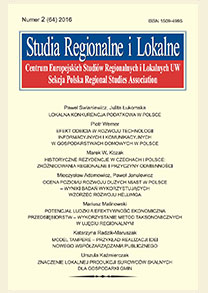An Interdyscyplinary Model of Centre-Periphery Relations: A Theoretical Proposition
An Interdyscyplinary Model of Centre-Periphery Relations: A Theoretical Proposition
Author(s): Tomasz ZaryckiSubject(s): Social Sciences
Published by: EUROREG - Uniwersytet Warszawski, Regional Studies Association - Sekcja Polska
Keywords: centre-periphery relations; Rokkan theory of centre-periphery cleavages; discourse analysis; Bourdieu's theory of types of capital
Summary/Abstract: The paper proposes a model in which centre-periphery relations defined at a high level of generality (from the global level down to regional structures) can be analysed from a perspective of a number of disciplines, including political science (e.g. Rokkan’s theory of peripheries and centre-periphery cleavages), sociology (e.g. Bourdieu’s theory of the forms of capital) and linguistics (discourse analysis including code switching and politeness theories). It focuses on the nature of the discourse of peripheral elites which, as it is argued, live in a two or more dimensional social space and communicate in at least two separate codes (particularly languages): peripheral and central. Using the above mentioned theoretical concepts, the paper offers an attempt at theorisation of the mechanism of mutual perception of the centre and the periphery.
Journal: Studia Regionalne i Lokalne
- Issue Year: 8/2007
- Issue No: Spec.Iss.
- Page Range: 110-130
- Page Count: 21
- Language: English

